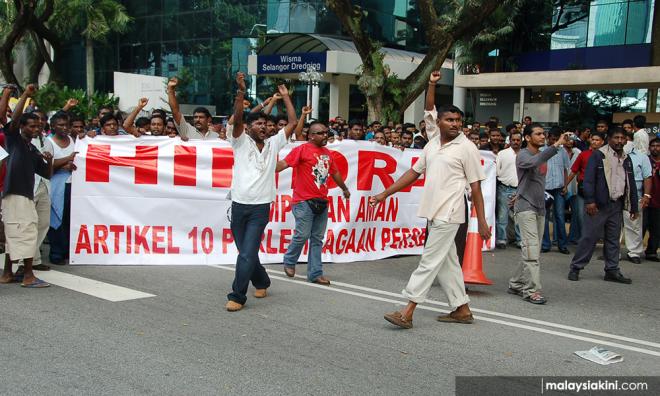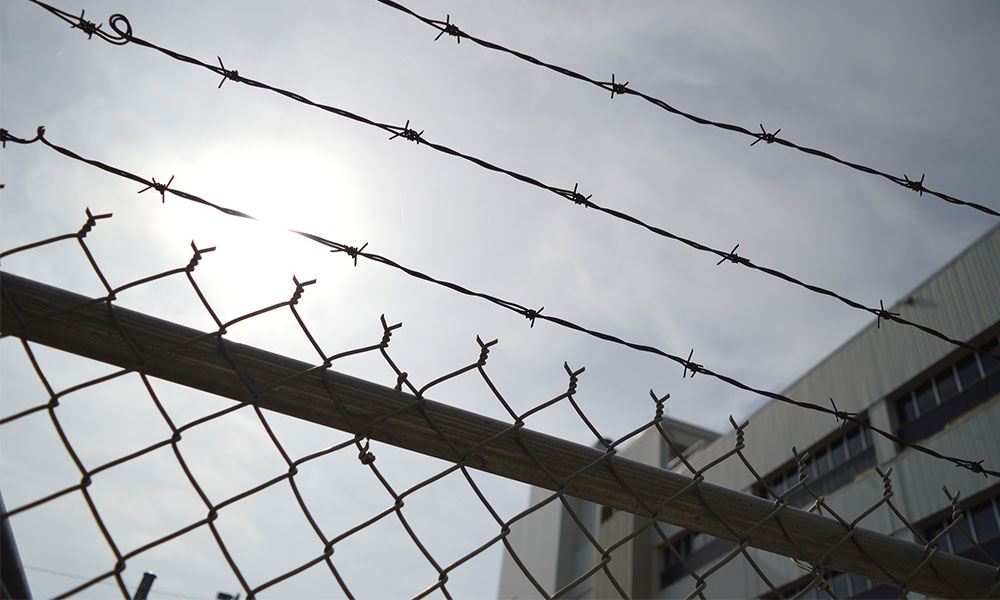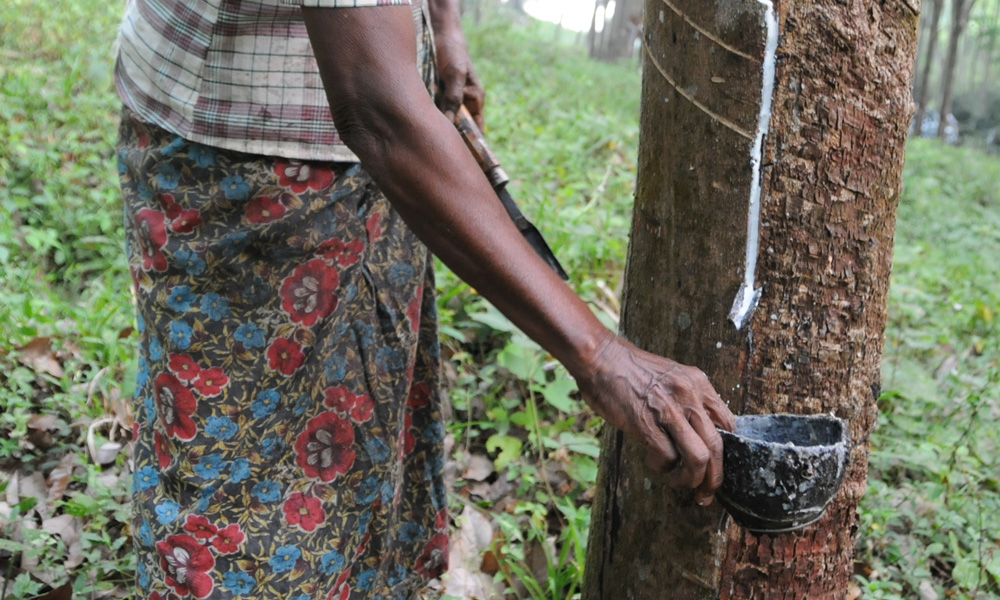
How quickly Malaysians forget history.
The 2007 demonstration by mainly ethnic Indians organised by Hindraf was instrumental in effecting the tsunami in favour of the Pakatan Rakyat coalition during the 2008 General Election and which saw the downfall of BN in 2018.
How did that Hindraf rebellion happen if it had not been for the fact that Malaysian Indians were, and still are, among the most marginalised and oppressed minorities in the country?
Today, the old leaders of Hindraf are silent on the Black Lives Matter movement that has erupted all over the world. After all, they were the ones who handed in a memorandum on "Police Shootings and Deaths in Custody" to the authorities on 4 March 2004. Alas, it looks as if the Hindraf leaders have been thoroughly turned over and co-opted by the ruling coalition, even seduced by a ministerial post.
Middle-class Indians may want to claim otherwise but obviously, it is the mainly the working-class ethnic Indians who bear the brunt of this racial discrimination. Most of the time, it is the poor and marginalised Indians and not the well-feathered Indian lawyers, doctors, engineers and businessmen who bear the brunt of police brutality. A local NGO, Edict, has even gone to the extent of saying:
“There is no compelling data to support statements that the Malaysian police systematically target Indians. The truth is, police misconduct is race-blind in Malaysia. In Malaysia, the response to George Floyd’s death should be a response to police brutality, not a response to (alleged) discrimination against Indians.

In furthering this assertion, Edict claims Suaram’s statistics on deaths in custody in Malaysia in our Human Rights Reports are flawed. My colleague in charge of documentation and monitoring will respond to these allegations in time.
Is racism against ethnic Indians imagined?
In recent years, a pattern has emerged in which ethnic Indians, who number less than 10 percent of the total population, find themselves the disproportionate majority in official statistics on deaths in police custody and victims of police shootings.
This reflects the racist portrayal of the marginalised Indian community in our state institutions. Through the years, we have also witnessed many cases of racial slurs against ethnic Indians in the mainstream media and even in school textbooks. There have also been complaints of anti-Indian racism in tertiary level institutions.
Racism against ethnic Indians also exists in mainly Malay-dominated residential schools:
“A minority in a residential school has to undergo some unpleasant experiences. The minority group has to fit neatly into the new society which comprises mostly bumiputera students. Other races, particularly the Indians, have to adapt to the new situation by accepting the usual calls of keling or the repetitious rhyme of lingko-lingko.”
From March 8 to 23 in 2001 at Kampung Medan, Petaling Jaya, five Indians were killed and more than 100 Indians were seriously wounded in racially-motivated criminal acts.
The police claimed they were “unable to control the situation” even though all these incidents happened within a 10 square kilometre area and the police had cordoned off the area. Despite loud calls by civil society for an impartial inquiry into this incident, there has to date been no such inquiry or any attempt to bring the perpetrators of these crimes to book.
The official version of the Kampung Medan violence in 2001 was that the “riots” had been sparked by incidents which ignited “naturally” in a neglected urban ghetto. As documented by researchers, the violence, which started on March 8, 2001, was allowed to continue over several days in a relatively small enclave of Petaling Jaya – with the last tragic incident occurring on March 23.
This delay by the police in taking action reveals a serious credibility problem surrounding our law enforcement and security forces. How is it that these forces failed in their duty to apprehend the thugs who unleashed the racial violence and also failed to investigate those who had organised the violence?
Eyewitness accounts show that in some of the racial attacks there, the police just stood by without stopping and apprehending the thugs.
It is worthy of note that just before the racial violence at Kampung Medan in 2001, the so-called “Malay Action Front” organised a rally at which the keris (Malay dagger) was provocatively unsheathed and this far-right group pledged to defend “Malay ethnic supremacy”.
Displaced from the estates and devoid of opportunities for retraining or assistance under the New Economic Policy (NEP) since they are not bumiputera, Indian plantation workers and their families have been forced into low-paid urban employment or the informal sector and to live in urban ghettos.

Portrayed as an “underclass” by the media which highlights gang fights and other crimes committed, the working-class Indians have often been subject to ridicule and racist slurs.
Racism infused in national institutions
In the light of the above, I am surprised that Edict can, with a straight face, claim that the Malaysian police are “race-blind”.
Racism has been thoroughly infused in all our national institutions, including racist indoctrination of bumiputera in state institutions such as the National Civics Bureau (BTN) which recently came to light.
Above all, racial discrimination in the neverending NEP facilitates crony capitalism which is essential to Umno’s monopoly of power. This has not changed since the Mahathir 1.0 era.
The ethnic Indian working class and the indigenous peoples in both East and West Malaysia are the poorest communities in Malaysia; the former and the Orang Asli cannot rely on “bumiputera” privileges, while the indigenous peoples of East Malaysia do not enjoy the same amount of state largesse as the Malays in West Malaysia even though they are categorised as bumiputera.
Reform the police, eradicate racism and racial discrimination
As the Black Lives Matter movement has demanded, disproportionate numbers of ethnic minority deaths in police custody must stop with the immediate reform of police methods of policing.
The long-delayed recommendations of the Royal Police Commission of 2005 for an Independent Police Complaints and Misconduct Commission must be the order of the day.
And as for eradicating racism & racial discrimination in this country, we must put the ratification of the International Covenant on the Eradication of Racial Discrimination back on the national agenda. Otherwise, we are back to the old normal of institutionalised racism in which black lives don’t matter.
References:
The Malaysian Insider, Nov 27, 2009
New Straits Times, Feb 4, 1987
Nagarajan & Arumugam, Suaram, 2012
Bernama, Feb 10, 2001
Racism & Racial Discrimination in Malaysia, Kua Kia Soong, Suaram 2015
New Straits Times, Feb 4, 1987
Nagarajan & Arumugam, Suaram, 2012
Bernama, Feb 10, 2001
Racism & Racial Discrimination in Malaysia, Kua Kia Soong, Suaram 2015
The writer, Kua Kia Soong is a Suaram adviser. - Mkini


No comments:
Post a Comment
Note: Only a member of this blog may post a comment.